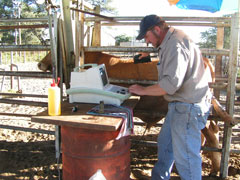
Profits from beef research put to the test

The benefits of producing beef which scores highly for traits such as marbling, tenderness and meat yield is to be assessed in conjunction with three large meat processing works in NSW and Queensland.
The three abattoirs, which together process more than 300,000 cattle a year, have agreed to take part in “proof of profit” demonstrations being led by the NSW Department of Primary Industries (DPI) in conjunction with the Queensland DPI for the Beef Cooperative Research Centre (CRC).
Animal Production Research Leader, Bill McKiernan, says cooperation with the abattoirs will allow DPI research into desirable meat quality and production traits, including feed efficiency, to be put to the test.
“As a first step, there should be a profit incentive to adopt the technology.
“Also, as we develop our scientific knowledge to help predict how animals will perform, we also want to be able to prove that the technology works in practical ways.”
The first trait to be put to the dollar test will be marbling.
Mr McKiernan says steers from a feedlot in Queensland are to be scanned next month using ultra-sound.
“Those animals which scan highly for marbling will be identified.
“After slaughtering, data on carcass quality and returns from these cattle will be gathered.”
Mr McKiernan said the meatworks have agreed to be involved in helping to develop models for predicting carcase traits, trialling the models and in providing access to their extensive live animal and carcase data.
He said the research will provide a financial underpinning to the next stage of the CRC’s research – the selection of gene markers for desired quality and production traits.
“This will provide a means of developing tests to assist producers in selection for the traits they want.
“The outcome will be more efficient production of beef, and from the consumer’s point-of-view, more guarantee of consistent eating quality.”
The meatworks have also agreed to take part in producer focus groups aimed at ensuring rapid adoption of the technology.
The research, with abattoirs in Brisbane and Warwick, Queensland, and Yanco in NSW, is to be undertaken over the next three years.
Email:

